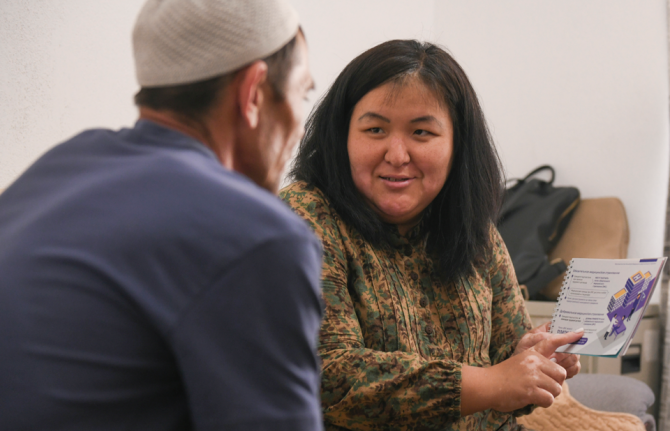
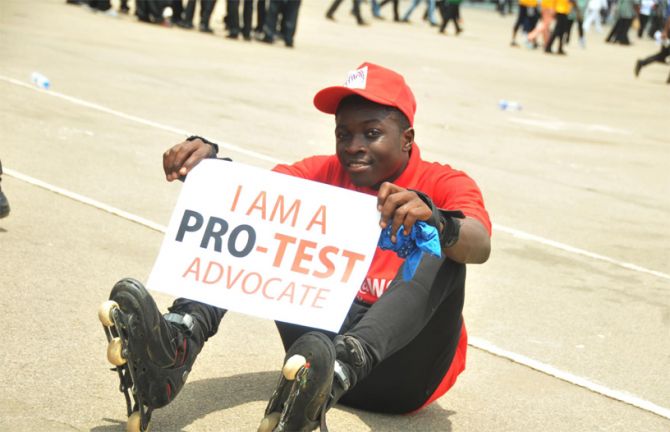
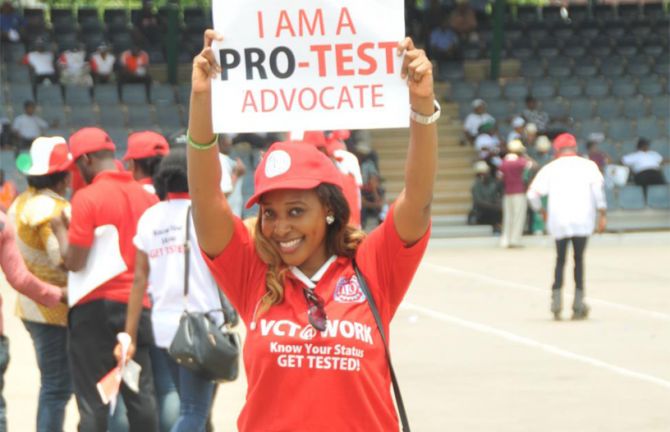
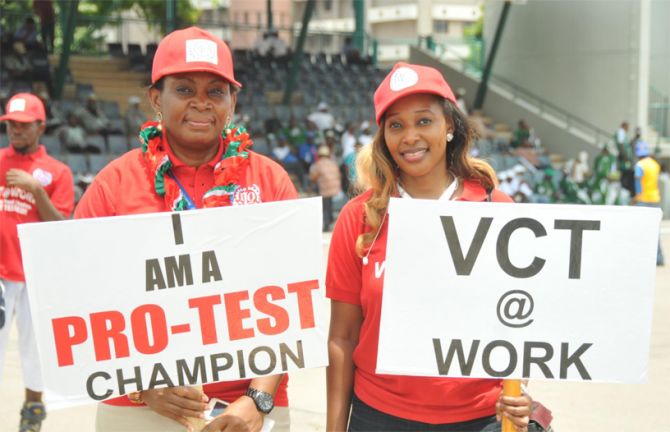
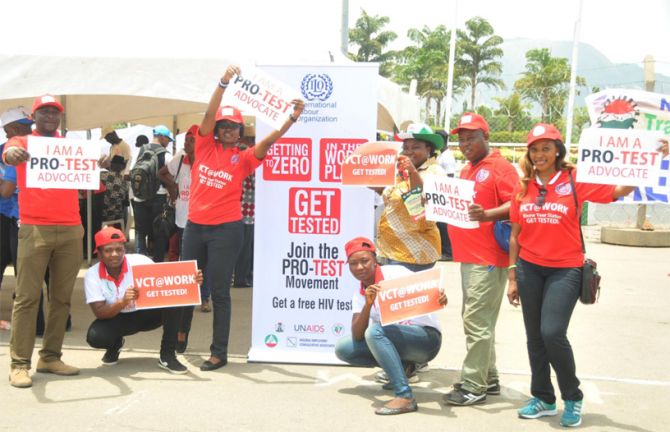
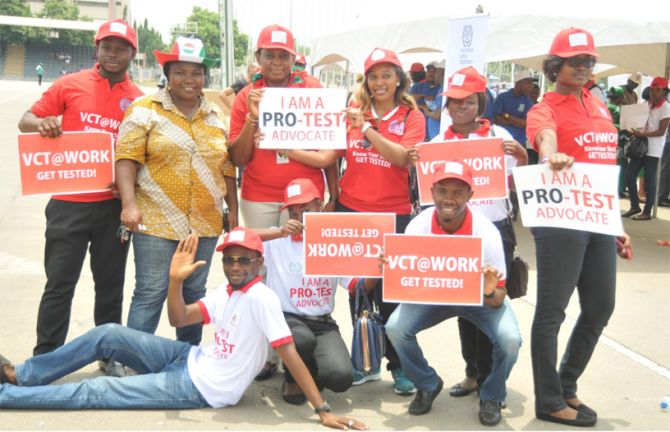
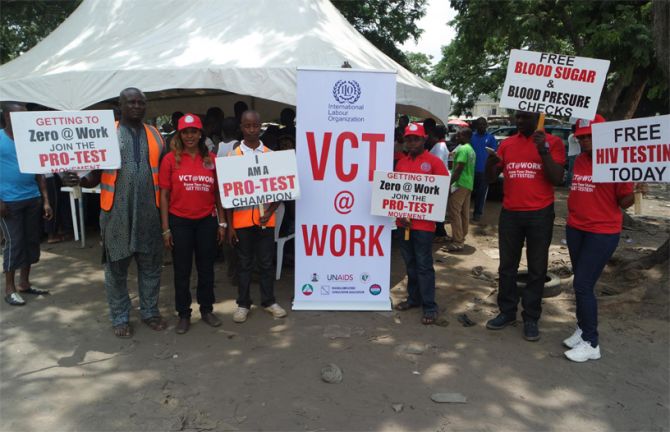
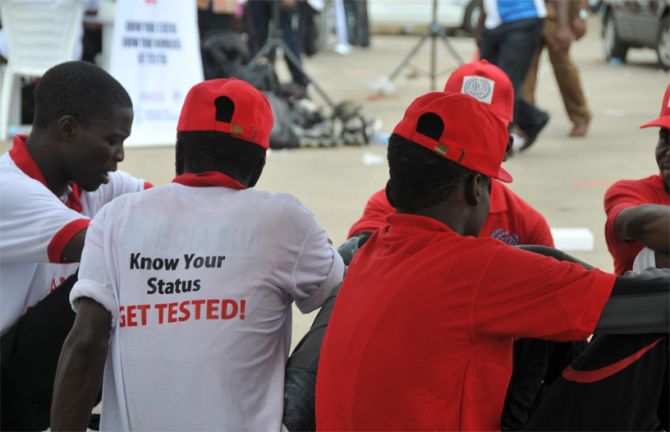
Update
Access to HIV testing at work in Nigeria
22 May 2015
22 May 2015 22 May 2015On 1 May, Workers’ Day, UNAIDS joined up with the International Labour Organization’s VCT@WORK initiative to scale up voluntary counselling and HIV testing in Nigeria.
The VCT@WORK initiative aims to increase access to HIV testing services in the workplace and refer people living with HIV to HIV treatment, care and support services. It also aims to empower workers by providing them with information about HIV and encouraging them to find out their HIV status.
As part of the initiative, the Nigeria Labour Congress organized events throughout the country’s 36 states, bringing together workers, professionals, students and members of civil society organizations. Nearly 6000 Nigerian workers—including 1300 young people—took an HIV test. People who tested positive for HIV were referred to appropriate health services for follow-up.
In Abuja in the Federal Capital Territory (FCT), service providers linked to the National Agency for the Control of AIDS provided free multidisease screening, which included HIV testing and measurement of blood pressure, blood sugar and body mass index. This multidisease screening approach has proved to be effective in increasing the uptake of HIV tests and offers more value to workers who come to test. The FCT was selected since it is one of the 13 states that account for 70% of people living with HIV in Nigeria.
The VCT@WORK initiative of the International Labour Organization and the UNAIDS ProTest HIV initiative are joining forces to expand the reach of HIV testing to workers and young people worldwide. Both initiatives aim at demystifying and normalizing HIV testing and are exploring ways in which this can be achieved.
Quotes
“I cannot wait to see the sight of a team of health professionals coming to take our blood pressure and conduct checks for blood sugar and HIV for my fellow mechanics.”
“If workplaces embrace the VCT@WORK initiative it could signify one of the most important advances we’ve seen in expanding access to HIV testing within a healthy, enabling environment and linked to ongoing support, including treatment.”
“We can defeat HIV by testing today and accessing life-saving treatment. The VCT@WORK/ProTest HIV movement offers this opportunity. Let’s Fast-Track the response by scaling up HIV testing.”

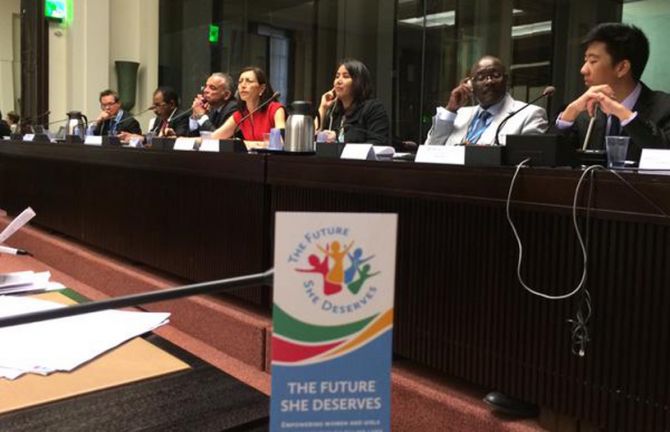
Update
Advancing the rights and autonomy of adolescent girls and young women
21 May 2015
21 May 2015 21 May 2015A lack of protection and promotion of young women’s and adolescent girls’ rights and autonomy continue to present a challenge to a Fast-Track approach to ending the AIDS epidemic, according to experts at a World Health Assembly side event held in Geneva, Switzerland.
Participants stressed how enhancing the availability of HIV services for adolescent girls and young women is not enough. Data show that less than 30% of currently married adolescent girls and young women aged 15–24 years have a final say regarding their own health care at the household level.
Age restrictions, including parental and spousal consent, inhibit access to HIV and sexual and reproductive health services. Furthermore, studies show that women who have been exposed to intimate partner violence are 1.5 times more likely to acquire HIV. Globally, 20% of the world’s married or partnered young women are estimated to have experienced physical or sexual violence by a partner in the past 12 months.
According to the participants, there are promising programmes that work to transform gender norms and reduce HIV incidence among young women and girls. For example, community programmes that focus on reducing partner violence and cash transfer programmes that provide girls with economic empowerment and autonomy.
Entitled Adolescent Girls’ Health: Approaches to Ensuring the Future She Deserves, the event was cosponsored by UNAIDS.
Quotes
“Every adolescent girl deserves our full investment right now to realize the healthy future she deserves, so that she can reach her full potential.”
“UNAIDS and partners are committed to ensuring that adolescent girls’ and young women’s sexual and reproductive health and rights are enshrined in our collective efforts to end the AIDS epidemic by 2030.”
68th World Health Assembly
Related
 “Who will protect our young people?”
“Who will protect our young people?”

02 June 2025

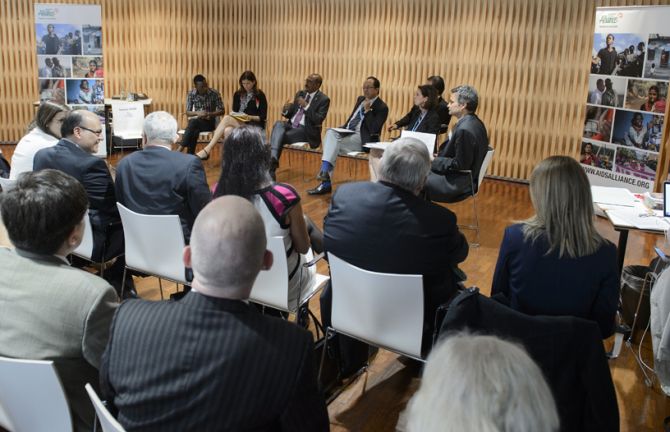
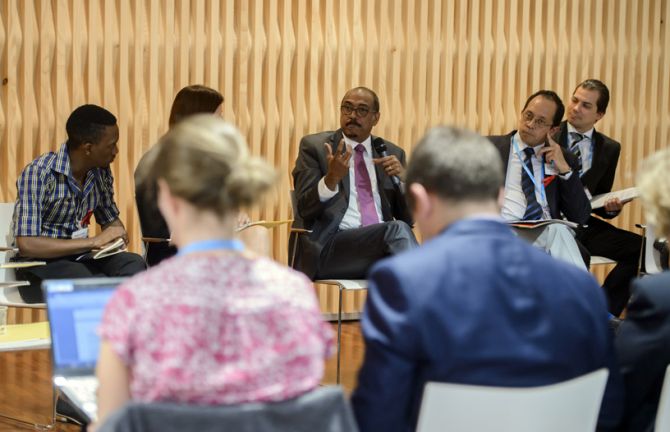
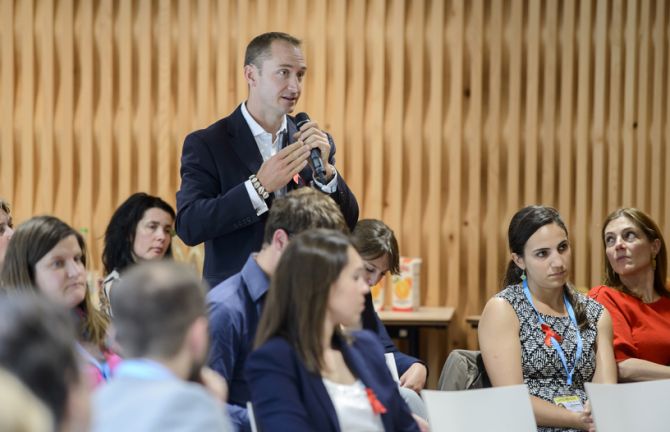
Update
Ensuring universal health coverage for key populations
20 May 2015
20 May 2015 20 May 2015Without addressing HIV among marginalized populations and human rights, it will not be possible to end the AIDS epidemic as a public health threat by 2030, according to experts at a World Health Assembly side event.
A high-level panel, which included UNAIDS Executive Director Michel Sidibé, called on health ministers to pledge to remove structural barriers to accessing HIV services and health care for all. The speakers also stressed the need for political commitment to leave no one behind. Ensuring that marginalized populations are not excluded from the universal health coverage target of the next sustainable development goals will be vital, they noted.
According to the participants, there is a risk that countries could seek to advance progress towards universal health coverage by focusing on easier to reach populations. In order to ensure that no one is left behind, measures will be needed to reduce the discrimination facing all marginalized groups and to ensure their meaningful participation in the development and implementation of health strategies.
The event set the stage for further dialogue among ministers of health to promote sharing of experiences on securing access to HIV services and health care for all.
Organized by the International HIV/AIDS Alliance, co-hosted by Luxembourg, Morocco and Ecuador and supported by UNAIDS, the event took place on 19 May at the International Red Cross and Red Crescent Museum in Geneva, Switzerland.
Quotes
“In the post-2015 era, global governance systems must be inclusive and people-centred. Fragile communities exist from Baltimore to Bamako and we need better systems for health to make sure we reach people on the margins.”
“We need a system for health rather than a health system! Since 2008, Ecuador’s constitution has embraced universal coverage. It is important that universal coverage includes social protection and human rights, including for marginalized people.”
“We really have to fight to have equal access to universal health coverage and social protection. For this, we have to work together: civil society, governments and the different ministries at the global, national and local level.”
“Universal health coverage should not be a question of gender, sexual orientation or age.”
“It is really a multisectoral approach from here to September. We need to fit our issues into the universal health system. We have two overarching goals: to remove the barriers and to have equity for all.”
68th World Health Assembly
Related



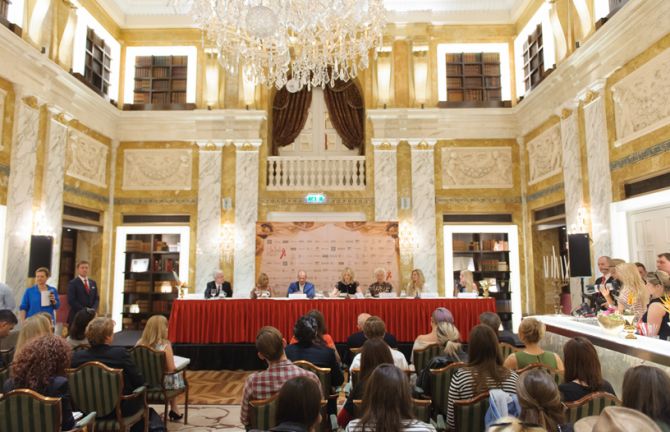
Update
Life Ball raises funds for AIDS response
18 May 2015
18 May 2015 18 May 2015The Life Ball 2015 united celebrities and partners in the Austrian capital, Vienna, for one of Europe’s biggest fundraising events for HIV.
Organized by Gery Keszler, Chair of the nongovernmental organization AIDS LIFE, this year’s event featured Charlize Theron, representing the Charlize Theron Africa Outreach Project, Sean Penn, on behalf of the Clinton Health Access Initiative, UNAIDS Goodwill Ambassador for Eastern Europe and Central Asia Vera Brezhneva, Mary J. Blige, representing AmFAR, and fashion designer Jean-Paul Gaultier, who hosted this year’s Life Ball fashion show. Conchita Wurst, winner of the 2014 Eurovision Song Contest, performed at the opening show in front of thousands of people.
The evening’s activities began with the AIDS Solidarity Gala, a fundraising dinner under the patronage of Austrian Federal President Heinz Fischer and Editor of Vogue Italia, Franca Sozzani, and co-hosted by UNAIDS and AIDS LIFE at the Hofburg Palace.
A portion of proceeds from the gala will be used by UNAIDS to implement the first-ever regional HIV awareness campaign in eastern Europe and central Asia. The campaign will feature Ms Brezhneva, whose popularity and social media following will reach millions of people.
At the First Ladies Luncheon, hosted by the Global Fund to Fight AIDS, Tuberculosis and Malaria and Fashion for Development, Ms Theron highlighted the needs of young women and girls in southern Africa. The Charlize Theron Africa Outreach project works to provide girls with the tools to protect themselves from becoming infected with HIV.
This year’s Life Ball Crystal of Hope was awarded to Sentebale, a nongovernmental organization working in southern Africa founded in 2006 by Prince Harry of Wales and Prince Seeiso of the Lesotho Royal Family. Its goal is to help children in Lesotho affected by the HIV epidemic and extreme poverty.
With more than 1500 volunteers and hundreds of commercial partners volunteering their time and support, each year the Life Ball generates millions of euros to support national HIV programmes in Austria and programmes around the world.
Quotes
"For 23 years, the Life Ball has succeeded in making a clear statement for open-mindedness and tolerance and against exclusion.”
"Everyone should know their HIV status and have access to life-saving HIV treatment, no matter who they are, where they live or whom they love."
"It is sad that in 2015, the issues of “social AIDS” and stigma and discrimination against people living with HIV are still a characteristic of our society. The Life Ball is a loud scream for inclusion and tolerance addressing these challenging issues. I wish that one day, there won't be any need for the Life Ball anymore."
"UNAIDS is calling on all partners to unite in ending the AIDS epidemic by 2030."
Resources


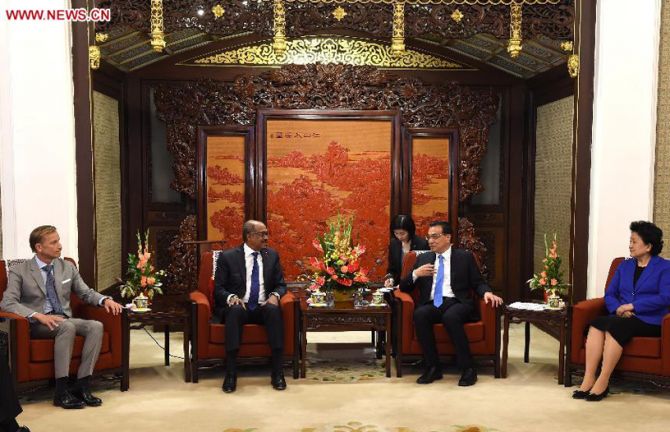
Update
Chinese Premier commits to ending the AIDS epidemic in China
04 May 2015
04 May 2015 04 May 2015The Premier of the State Council of China, Li Keqiang, expressed his support for the AIDS response during a meeting with UNAIDS Executive Director Michel Sidibé and the Executive Director of the Global Fund to Fight AIDS, Tuberculosis and Malaria, Mark Dybul, on 4 May in Beijing, China.
The Premier said that the Chinese government is focusing particularly on HIV prevention, while also strengthening HIV treatment programmes and improving the quality of care for people living with HIV. He said the government is working to eliminate discrimination against people living with and affected by HIV.
Both Mr Sidibé and Mr Dybul thanked China for its contribution to the Ebola response. China has provided US$ 120 million and 1000 health workers to the West African countries most affected by the Ebola epidemic over the past year.
The Premier also mentioned the importance of community-based organizations working on HIV prevention and treatment and he committed to providing more funding to support their work.
Mr Sidibé welcomed the Premier’s political commitment to ensuring that AIDS remains high on the global agenda and commended China’s progress in the response to HIV. The government estimates that 810 000 people were living with HIV in 2013 and that almost two thirds had access to HIV treatment by the end of 2014.
Earlier, Mr Sidibé and Mr Dybul met with Minister of Health Li Bin, who said that China will incorporate the global vision of zero new HIV infections, zero discrimination and zero AIDS-related deaths in its strategic planning, as well as the goal of ending the AIDS epidemic by 2030.
UNAIDS has called for global targets to be reached by 2020 in order to end AIDS as a public health threat by 2030: that 90% of all people living with HIV know their HIV status; 90% of all diagnosed with HIV have access to antiretroviral therapy; and 90% of all people accessing antiretroviral therapy with viral suppression. Minister Li said that said the 90–90–90 targets are clear and measurable.
Partners
Region/country

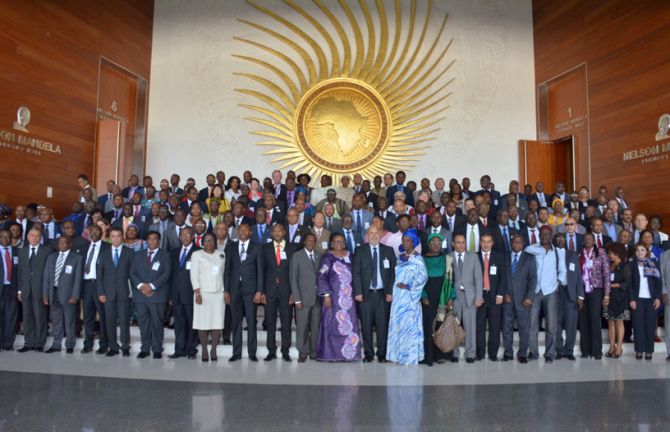
Update
African ministers commit to expanding affordable social protection for all
28 April 2015
28 April 2015 28 April 2015African ministers of social development, labour and employment meeting in Addis Ababa, Ethiopia, have called for expanded social protection for all to ensure inclusive development in Africa. During an event held from 20 to 24 April, and organized by the African Union, ministers agreed that a prosperous Africa can only become a reality if Member States extend comprehensive social protection measures.
Access to affordable and quality education and health services are among the measures that should be expanded to all, in particular vulnerable people. These include people living with and affected by HIV, women, children, people living with disabilities and older people.
The ministers further agreed that social protection policies and programmes in the continent should include social and cash transfers, as well as food and health security.
The 2014 UNAIDS Gap report highlights that cash transfers are a powerful tool for HIV prevention and treatment among young women and people living with HIV. In South Africa, a national study found that a publicly funded cash transfer programme had managed to reduce transactional sex by 53% and age-disparate sex by 71% among adolescent girls in families between 2009 and 2012. This is important in order to reduce their risk of exposure to unsafe sexual behaviour and the low condom use linked to relationships with large age differences.
Quotes
“South Africa was hit hard by HIV, but with high investments from the public and private sectors, including for social protection measures, we’ve been able to drastically reduce the rate of infections. Social protection is an important tool for the AIDS response and inclusive development.”
“We have evidence that social protection is a strategic tool to reduce vulnerabilities and inequalities, eliminate poverty and improve the productivity of the African workforce. Social protection efforts should extend to address gender inequality, HIV and other vulnerabilities in both the formal and informal sectors.”
“We need to ensure a strong social protection agenda that aligns with the African Union Agenda 2063 and is based on human rights. Social protection is important, particularly for women, children, people with disabilities and people from socially excluded groups, to ensure that no one is being left behind.”
Resources
Region/country
- West and Central Africa
- Benin
- Burkina Faso
- Burundi
- Cameroon
- Cape Verde
- Central African Republic
- Chad
- Congo
- Côte d'Ivoire
- Democratic Republic of the Congo
- Equatorial Guinea
- Gabon
- Gambia
- Ghana
- Guinea-Bissau
- Guinea
- Liberia
- Mali
- Mauritania
- Niger
- Nigeria
- Sao Tome and Principe
- Senegal
- Sierra Leone
- Togo
- Eastern and Southern Africa
- Angola
- Botswana
- Comoros
- Eritrea
- Ethiopia
- Kenya
- Lesotho
- Madagascar
- Malawi
- Mauritius
- Mozambique
- Namibia
- Rwanda
- Seychelles
- South Africa
- South Sudan
- Eswatini
- Uganda
- United Republic of Tanzania
- Zambia
- Zimbabwe
Related

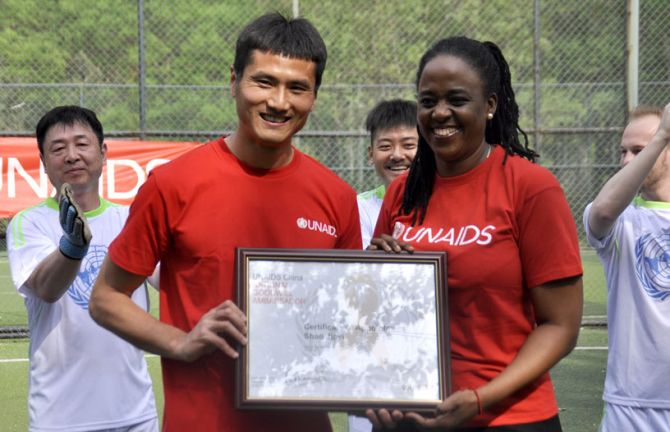
Update
Football star Shao Jiayi named UNAIDS National Goodwill Ambassador
27 April 2015
27 April 2015 27 April 2015UNAIDS appointed Chinese football star Shao Jiayi as a UNAIDS National Goodwill Ambassador on 27 April.
In his new role, Mr Shao will promote the goal of ending the AIDS epidemic as a public health threat by 2030 in China. He will focus on young people, encouraging them to become leaders in the response to AIDS and to help end stigma and discrimination towards people living with HIV.
The announcement was made at a match Mr Shao refereed in Beijing, where he currently plays in the Chinese Super League. Before joining the Beijing Guoan team, Mr Shao had an extensive career in Germany and represented his country at its first trip to the FIFA World Cup in 2002 and in Asian Football Confederation Asian Cup tournaments.
Quotes
“Football is a powerful platform for engaging young people and raising their awareness of the importance of preventing HIV, on the one hand, but also for speaking out in support of everyone who faces stigma and discrimination.”
We are thrilled to have Shao Jiayi join the UNAIDS team, as we know that with his commitment and star power we can encourage young Chinese people to learn the facts, become involved and help to end the AIDS epidemic by 2030. He is an inspirational voice against stigma and discrimination and a champion of people living with HIV.”
Region/country

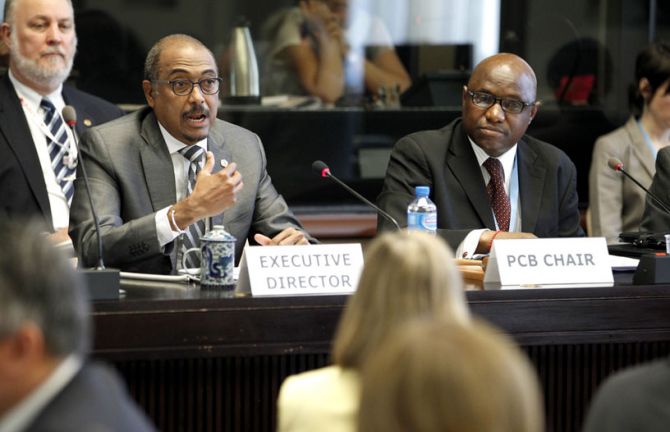
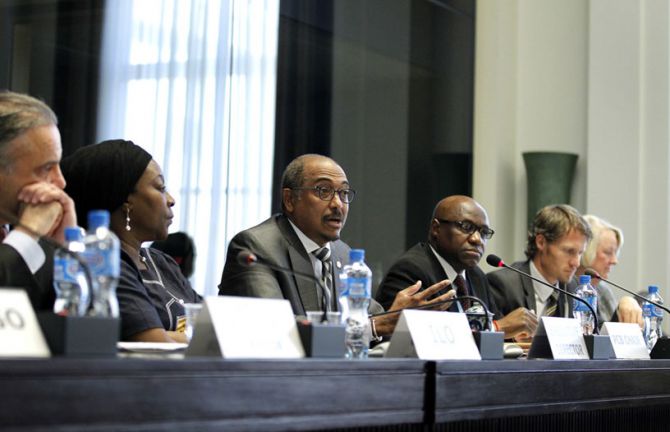
Update
Global multistakeholder consultation on the UNAIDS 2016–2021 Strategy
22 April 2015
22 April 2015 22 April 2015Representatives of United Nations Member States, international organizations and civil society are participating in a two-day global multistakeholder consultation on the UNAIDS 2016–2021 Strategy.
The global consultation, which follows a round of regional discussions and the completion of a virtual consultation, will review progress made and discuss the changes required to end the AIDS epidemic as a public health threat by 2030.
The consultation will be a key step in developing the UNAIDS 2016–2021 Strategy—to implement and deliver on the UNAIDS Fast-Track Targets.
The Strategy will mobilize and align partners, focus resources, inspire multisectoral action, reinforce related sustainable development goals, promote and protect human rights and gender equality and accelerate progress overall. Its implementation will ensure that no one is left behind and it will also reaffirm the UNAIDS vision of zero new HIV infections, zero discrimination and zero AIDS-related deaths, which continues to inspire and catalyse action.
The first draft of the Strategy will be presented to the 37th meeting of the Programme Coordinating Board of UNAIDS in October 2015.
Quotes
"The time has come to focus on fragile communities and not simply on fragile countries. It is in fact in fragile communities where we are leaving people behind in terms of health, development and dignity. This is our new universal challenge for countries rich and poor. Our strategy must contribute to turning the tide towards a more equal world."
"Allocating resources to AIDS is not an expense but an investment, and efforts in the AIDS response must continue in the spirit of shared responsibility and global solidarity."
"Norms in our countries say that women’s and girls’ bodies are not our own and our decisions are not our own. To fast track the UNAIDS strategy, we must focus on the full equality of women and girls. We must move from zero tolerance for gender-based violence to zero gender-based violence."
Related information
Related

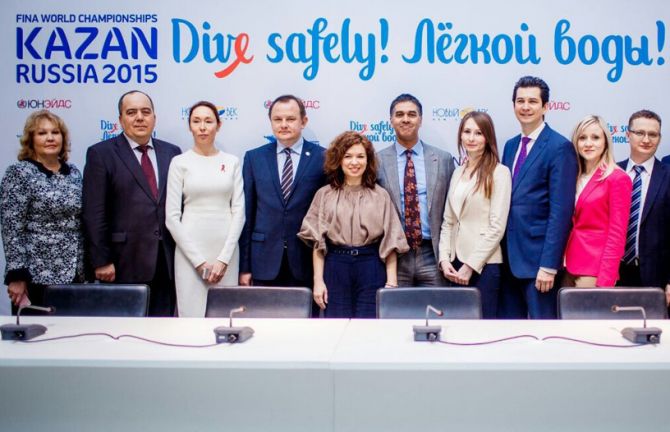

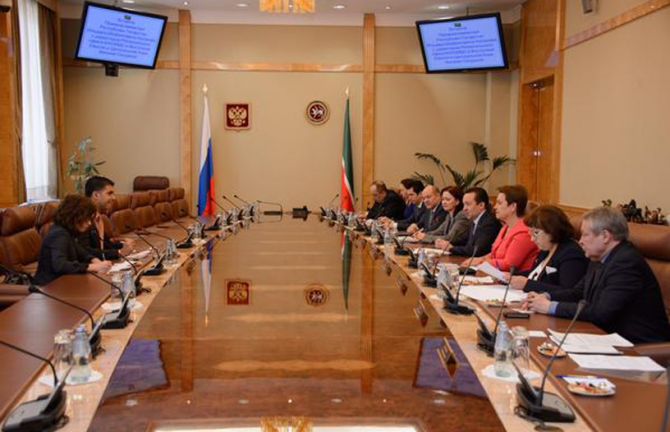
Update
HIV prevention programme Dive Safely! launched in Kazan ahead of the FINA World Championships
16 April 2015
16 April 2015 16 April 2015Dive Safely!, an HIV prevention programme to raise awareness during the upcoming aquatic World Championships, was launched in Tatarstan, Russian Federation. Representatives of the Directorate of Sports Projects, the Ministry of Health of Tatarstan, the nongovernmental organization New Century and the UNAIDS Regional Office for Eastern Europe and Central Asia signed the agreement on 14 April in Kazan, capital of Tatarstan.
The project will encourage young people to be tested for HIV during the global sporting event, which will unite 2000 athletes from over 180 countries in six aquatic disciplines. Organized by the Fédération Internationale de Natation (FINA) and hosted by the city of Kazan, the World Championships will be held from 24 July to 9 August.
Key components of the Dive Safely! programme include training sessions and workshops on HIV prevention for volunteers and staff of the Championships, a media campaign featuring sports celebrities and public figures and access to confidential rapid HIV testing and counselling at sport venues.
Vinay P. Saldanha, UNAIDS Regional Director for Eastern Europe and Central Asia, met with the Prime Minister of Tatarstan, Ildar Khalikov, to discuss collaboration on HIV prevention during the World Championships. In addition, they exchanged views on strategic opportunities for domestic manufacturing of high-quality, low-cost antiretroviral medicines in Tatarstan, which is important to close the gap in access to HIV treatment in the region.
In 2013, there were 1.1 million people living with HIV in eastern Europe and central Asia and the number of new HIV infections was estimated at 110 000.
Quotes
“Cooperation with UNAIDS during global sports events like the FINA World Championships will launch a new collaboration to reach ambitious new targets for HIV prevention, testing and treatment, essential to ending the AIDS epidemic in Tatarstan.”
“I am honoured to be a spokesperson for Dive Safely! I am confident that together we will draw attention to HIV, prevent new HIV infections among young people and help people who most need our support.”
“We are pleased to strengthen our cooperation with Tatarstan in the HIV response. I am convinced that our joint project during the FINA World Championships will be an important milestone towards ending the AIDS epidemic in Tatarstan, in the Russian Federation and in the region.”
Region/country
Related

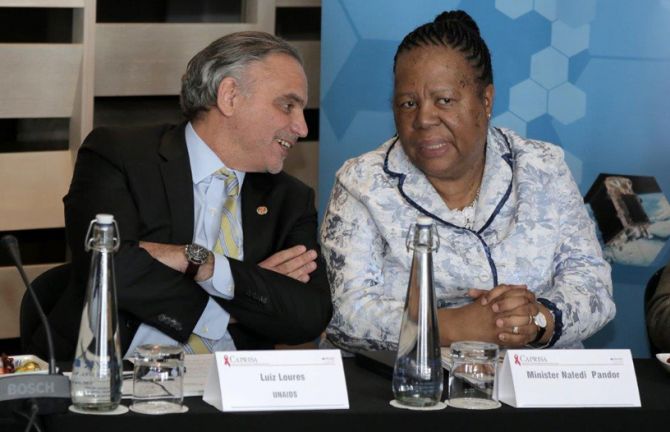
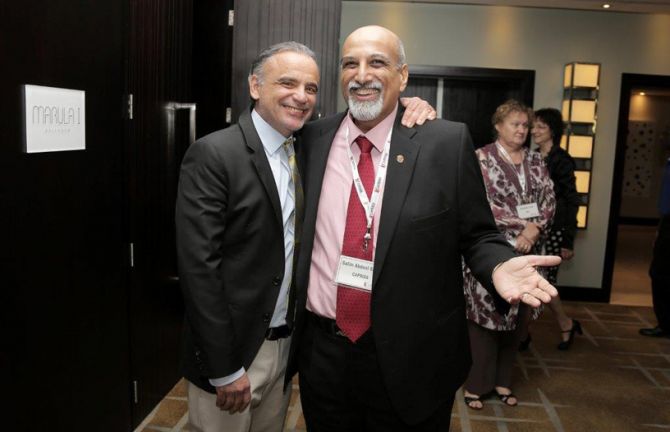
Update
CAPRISA designated a Centre of Excellence for HIV prevention
16 April 2015
16 April 2015 16 April 2015The Centre for the AIDS Programme of Research in South Africa (CAPRISA) at the University of KwaZulu-Natal has been designated as a National Research Foundation Centre of Excellence for HIV prevention by the South African Department of Science and Technology. The announcement was made on 14 April at the opening of the annual CAPRISA Scientific Advisory Board meeting, held in Durban, South Africa.
CAPRISA, a UNAIDS Collaborating Centre for HIV Research and Policy, has been recognized for its pioneering work in cutting-edge research as well as for its training programme for doctoral and medical students.
Speaking at the opening of the meeting, Luiz Loures, Deputy Executive Director of UNAIDS, emphasised the critical role CAPRISA plays in global efforts to end the AIDS epidemic by 2030.
The need to find new ways to prevent new HIV infections among young women and girls between the ages of 15 and 24 in South Africa emerged as a clear priority during the meeting, since they remain at a much higher risk of HIV infection than boys and young men of the same age group. The participants agreed that scientists have a key role to play in understanding and addressing the gender gap, in partnership with government and civil society.
Established and emerging scientists from around South Africa presented innovations in HIV and tuberculosis-related science at the meeting that will provide a direction for current and future scientific research led by CAPRISA.
At a press conference, CAPRISA also announced that Nobel Laureate Françoise Barré-Sinoussi, was appointed to its Scientific Advisory Board for a three-year term. Along with fellow board members, she will guide and advise CAPRISA on research ideas and plans.
Quotes
“UNAIDS has outlined a critical Fast-Track strategy to end the AIDS epidemic as a public health threat by 2030. Countries will need powerful tools to maximize accountability and ensure that no one is left behind. South Africa is committed to support and conduct scientific research to make sure that we achieve our targets.”
“We need a convergence of science, commitment, activism and funding to reduce new HIV infections among young women and girls. No country can work in isolation and we need to think on a global level to address this challenge.”
“The progress we made in the AIDS response undoubtedly brought hope to people. However, we need science to keep this hope alive. UNAIDS is proud to be working closely with CAPRISA. Together with UNAIDS, research institutes like the Centre for the AIDS Programme of Research in South Africa are critical to ensuring that science is working for and with people, especially those being left behind by the current AIDS response.”








